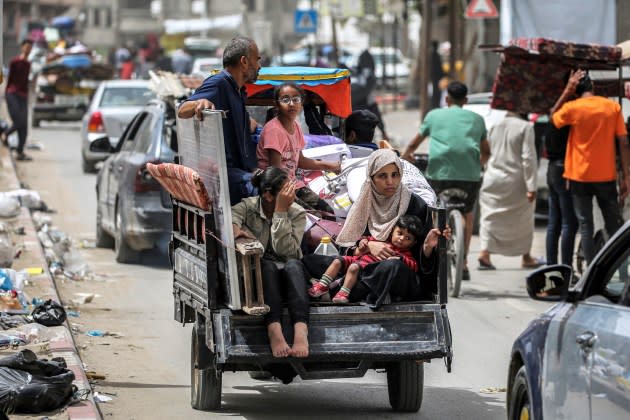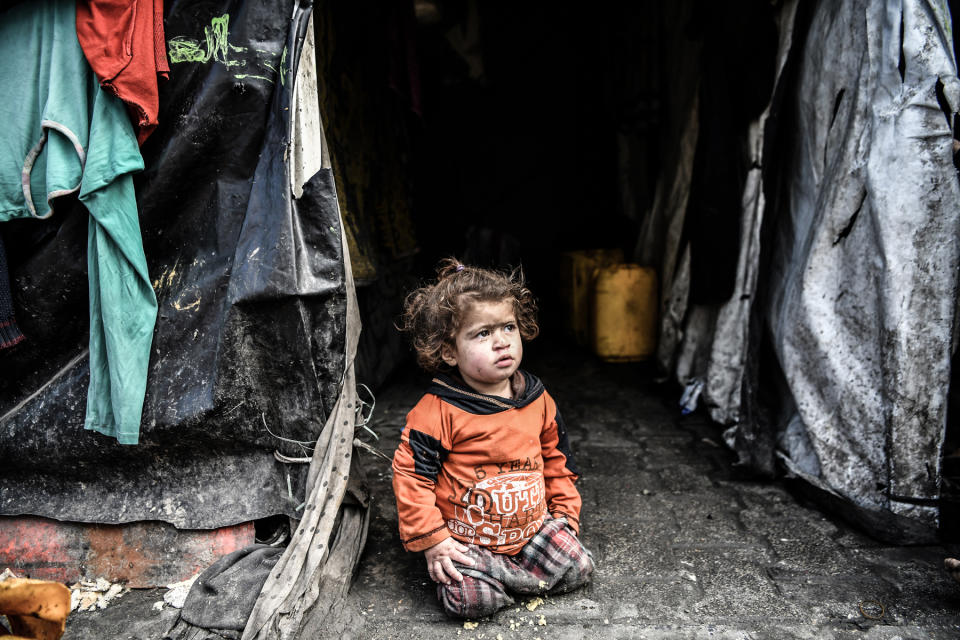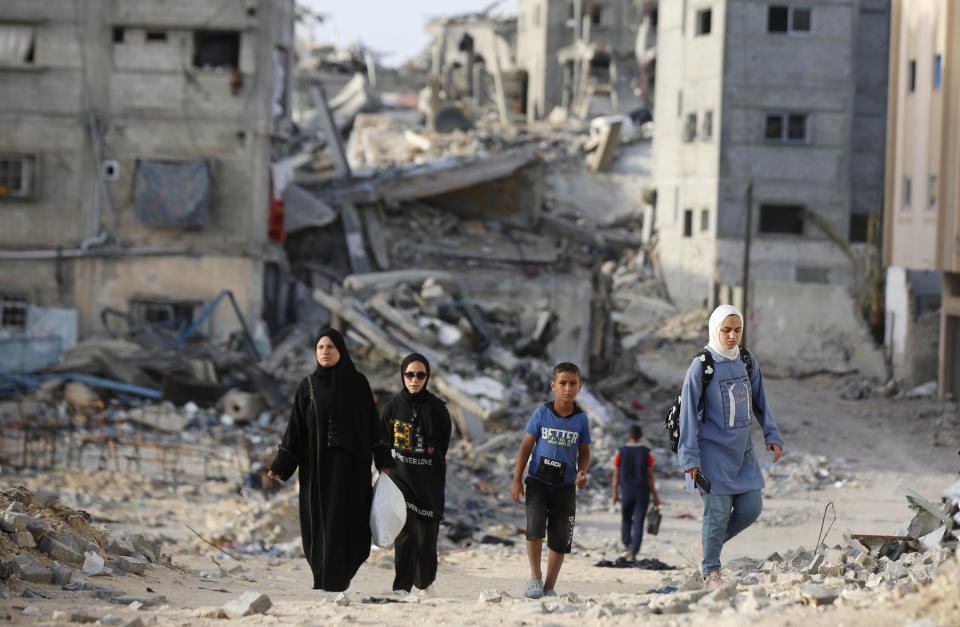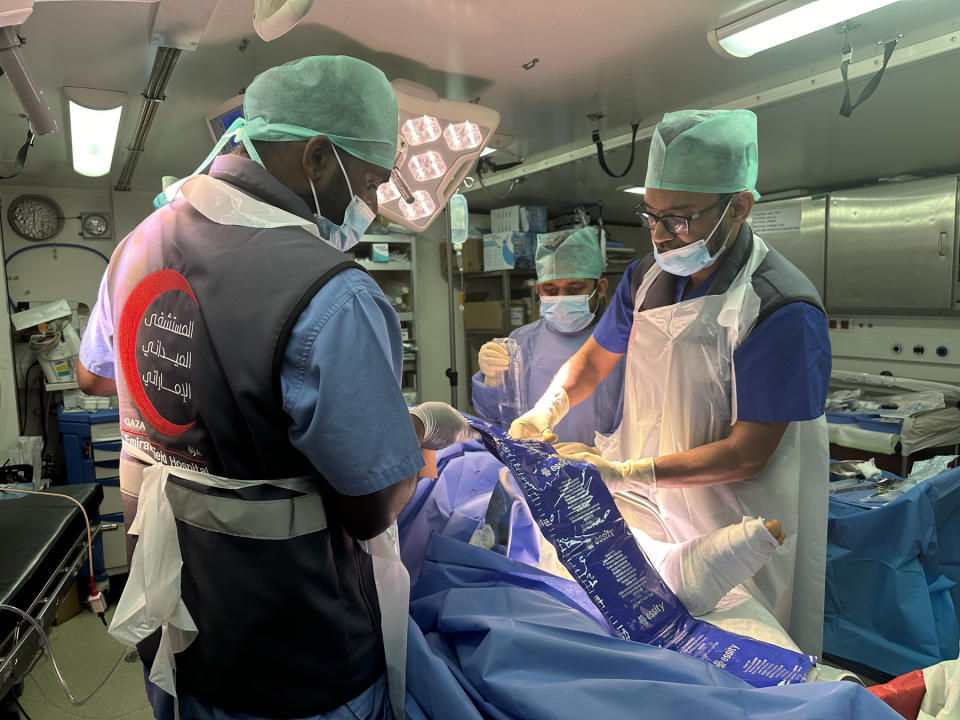As Israel Invades Rafah, People Flee Gaza’s Last Standing City Into Rubble

“Rashed Saber” was thrown from bed and concussed last Wednesday when an Israeli drone missile crashed through his family’s home in eastern Rafah at 5:30 a.m. He doesn’t know how he survived the attack.
The young doctor, who fled Israel’s invasion of Gaza City and has spent most of the war working in emergency rooms to save as many of Gaza’s 79,000 wounded as possible, grabbed what he could carry and ran with his family. Now, on a packed beach next to the shattered city of Khan Younis, Saber and his family are some of the estimated six hundred thousand Palestinians who escaped the Israeli onslaught in Rafah to seek safety in the rubble that Israel left behind.
“Water is costly and mostly polluted. Sewage is everywhere,” Saber says about the improvised Al Mowasi beach camp that is now home. Amid rats and outbreaks of hepatitis A, he is stunned by the squalor that people are forced to pitch their tents in. “It’s just not human.”

Saber is not his real name — he insists on using a pseudonym out of fear of Israeli reprisal. Surviving a war where hospitals have been systematically targeted by the Israeli military, where doctors have been stripped and marched through Gaza’s streets before disappearing into a detention system rife with stories of torture, he feels like a target.
So far, Israel’s war in Gaza has killed more than 35,000 Palestinians of all ages, and most of Gaza’s 2.2 million residents have been displaced. Israel launched its assault after the Oct. 7 attacks, when Gazan fighters led by Hamas killed an estimated 1,200 Israeli civilians and soldiers while taking another 250 captive, in a grisly series of massacres.
As Israel turned 76 this week, again at war and invading a Palestinian city, Rafah’s Palestinians have felt a repeat of history. For them, May 15 is the Nakba, or Catastrophe, when 750,000 Palestinians were forced from their homes and land by the emerging Israeli State, and again they are on the run. While most of their grandparents arrived in Gaza seeking safety from the 1948 Arab-Israeli war, most of those fleeing Rafah have already been displaced multiple times in a war that has triggered the worst Palestinian existential crisis since they were exiled from their homeland.
Long dreaded by Rafah’s residents and the estimated 1.2 million Gazans desperately seeking sanctuary there from Israeli invasions in the rest of the strip, this invasion of a city full of people with nowhere left to go was supposed to be a red line for the Biden administration.
President Joe Biden warned Israel on CNN last week: “I made it clear that if they go into Rafah — they haven’t gone in Rafah yet — if they go into Rafah, I’m not supplying the weapons that have been used historically to deal with Rafah, to deal with the cities, that deal with that problem.”
Despite the tough talk that presents what people in Rafah are experiencing now as a future possibility, the Biden administration has only held up one shipment of bombs and guidance systems — and just allowed another $1 billion weapons deal with Israel to proceed, even after the Biden State Department acknowledged that American supplied weapons were “likely” used in potential war crimes.

Holding fast on his assertion Israel will fight alone if necessary, Israeli Prime Minister Benjamin Netanyahu has insisted the risk of losing American diplomatic cover and billions of dollars in military aid won’t stop Israel’s invasion. Nervous about the perception of losing American support, however, the Israeli military’s top spokesperson, Daniel Hagari, has made televised statements boasting about America’s “unprecedented” arms support in seven months of war and the close coordination between both countries’ militaries.
Saber is outraged that U.S. weapons and backing for Israel’s war is enabling the complete destruction of Palestinian society in Gaza. With nothing apart from what he could carry as he fled, he feels Palestinains have been abandoned by the world while taking some solace in the American students leading a mass movement to change that. “The new generation of Americans are fed up,” Saber believes optimistically. “They saw what was happening and acted upon it.”
With Israeli Prime Minister Benjamin Netanyahu rejecting Biden’s red line, Israel has smashed into the eastern part of Rafah and simultaneously reinvaded northern Gaza in what Netanyahu says is part of his hardline nationalist government’s effort to destroy Hamas. Both Israeli and Biden administration officials have attempted to portray the operation as “limited.” For Palestinians trapped in an indiscriminate war — where the International Court of Justice has ruled that Israel has plausibly committed acts of genocide — there is nothing limited about the new displacement and destruction. Rather, it feels like the first stages of a drawn out, full-scale assault on the besieged strip’s last standing city.
It’s a concern that has pushed Egypt, which has helped Israel maintain its 16-year blockade of the besieged strip on its northern Sinai frontier, to join South Africa’s genocide case against Israel at the ICJ. South Africa has issued a new emergency appeal to the world’s top court, asking it to order Israel halt its Rafah invasion. Once the closest to its Israeli ally of any leadership since its 1979 Peace Treaty, Abdel Fatah Al Sisi’s regime has frantically opposed Israel’s Rafah operation, fearing it could push Gazans across its border. It has even built walled off areas just inside northern Sinai to hold any Palestinian refugees that cross. After Israel seized control of the Rafah border crossing on May 6 — and closed the main access point for the trickle of aid that has made its way to a people the UN says are facing famine — Egypt decried it as a violation of its peace treaty with Israel.
Feeling increased shelling as her home in central Rafah shook and Israel ordered Gazans in eastern Rafah to flee in advance of its ground invasion last Monday, Dorotea Gucciardo was coordinating with foreign and local medical teams in some of the last vestiges of Gaza’s health system as things began to collapse. One of a handful of foreign aid workers in Gaza, the director of development for the Glia Project was supposed to be finishing her second Gaza visit since the war when the border was occupied.
The next day, as the Mohammed Yousef El-Najar Hospital in eastern Rafah was evacuated, Gucciardo started hearing stories from doctors who had seen the worst of war going into complete panic. “No one wants a repeat of Shifa [and] Nasser,” she says, referring to the bloody assaults that destroyed Gaza City’s Al Shifa Medical complex and Khan Younis’ Nasser hospital.
After Israeli troops withdrew from the two hospitals, civil defense workers unearthed mass graves where bodies were reportedly stripped and hands tied, displaying signs of torture and indicating mass executions. Already investigating Israel for its systematic attacks on hospitals, the gruesome discovery prompted the United Nations and human rights groups to demand fresh war crimes investigations.
With fuel running out and Israel issuing further evacuation orders, Gucciardo says many of the last hospitals of Rafah are closing wings and evacuating. “After notices of orders to move were sent, the majority of staff didn’t show up,” she says of Rafah hospitals in the path of Israel’s advance. “All hospitals are planning to evacuate if there is an order to.”

Watching Rafah steadily empty until she was relocated to a safer house in Al Mowasi — declared a safe zone by Israel despite nearby fighting and a basic lack of resources — Gucciardo sees the invasion as trapping Gazans in a widening killing field. With Israeli shells pounding the city from air, land, and sea as street fighting grows closer, it is not only those from Rafah’s east sent scrambling for their lives.
Gucciardo describes waking up on Monday, after Israel issued new evacuation orders, and looking out her window in central Rafah at what had been an impromptu tented refugee camp of thousands the day before to find it nearly empty, with those left packing up their tents. “What’s left are the remnants of life,” she says.
Fleeing Gaza City with his family under Israeli evacuation orders and aerial assault in October, Mohammed Rajab arrived in Al Mowasi via a UN shelter in Khan Younis, months ahead of those fleeing Rafah. The 40-year-old driver, translator, and logistics manager for Doctors Without Borders (MSF) is one of the few people still driving in Gaza.
Shuttling staff between hospitals in the bombarded central Gazan town of Deir Al Balah and Rafah, he now watches a constant flow of war-weary people arrive in Al Mowasi becoming ill and forced to rely on poorly-equipped health tents on the beach. “Israel is not even giving people a chance to be injured,” he says of people consistently dying from wounds that could be treated if Israel wasn’t restricting access to medicine and equipment.
Out of options and without anywhere safe in Gaza to go, Rajab is worried his family and him could still become a target: “The future feels very dangerous.”
More from Rolling Stone
Private Cannes Screening of Hamas Attack Film Canceled Due to 'Security Threat'
International Criminal Court Seeks Arrests Warrants for Netanyahu, Hamas Leaders
Best of Rolling Stone

